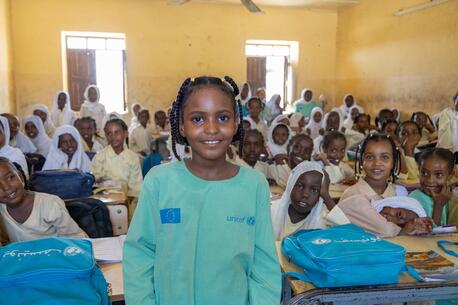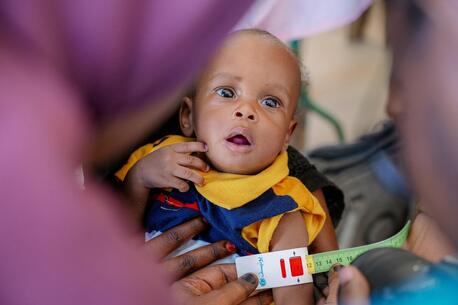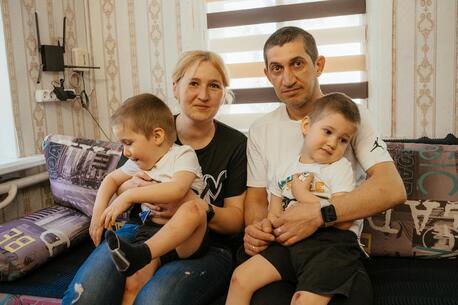
Crisis in Haiti: 'I Thought It Was the End for Me'
Surging violence in Haiti has forced thousands of families to flee their homes — and exposed displaced children to horrors no child should have to endure.
PORT-AU-PRINCE, HAITI: “It used to be very calm in my neighborhood,” says 9-year-old Jean* as he recalls how life used to be in the Savane Pistache area of Haiti's capital, Port-au-Prince. “I could go to school. I could visit the doctor when I was sick. I could play with my friends. And I could eat as much as I wanted.”
“But everything changed overnight.”
Jean says he was playing with some friends near his family’s house when he heard loud noises nearby. Was it gunshots? Surely no, not so close to his home. But as the sounds drew closer, he decided to run home to see what was happening. “I saw smoke rising in the sky. The houses in the neighborhood were on fire,” he says. “Our only escape route was through the back door. Everything happened so fast. We didn’t have time to bring anything.”
As we left our neighborhood, we saw people who had been shot lying on the ground, covered in blood. — Jean*, age 9
Stories like Jean’s have become tragically commonplace in recent months as armed violence has swept Port-au-Prince, spilling over into Artibonite department and other areas, forcing thousands of children and their families to flee in search of safety.
“As we left our neighborhood, we saw people who had been shot lying on the ground, covered in blood. We were in the middle of the street and didn’t know what to do,” Jean says. “To escape the danger, we found somewhere on a hill. We spent the night there but didn’t get a wink of sleep.”
From bad to worse
The next day, Jean and his family continued their journey, although they didn’t know where they should go next. “There were so many people in the same situation as us. Seeing all these people with bags and other belongings fleeing their neighborhoods was quite strange,” he says.
Jean’s family found a shelter, but it was too crowded for them to stay, so they pressed on, searching for somewhere safe to rest. “I was barefoot in the street,” Jean says. “I was hungry and thirsty. I thought it was the end for me.”

UNICEF estimates 3 million children in Haiti will require humanitarian assistance and protection in 2024
The first few months of 2024 have been marked by a significant decline in security conditions for families in Haiti, sparked by a surge in countrywide protests and demonstrations. The escalating armed violence has turned children’s playgrounds, schools and homes into war zones in many parts of Port-au-Prince. It has also restricted the delivery of aid, which is having a devastating impact on the estimated 5.5 million Haitians — including 3 million children — who will require humanitarian assistance and protection in 2024.
Jean’s family eventually found another shelter, but it didn’t have enough room for the whole family. “It was really tough,” he says. “It was hard to watch my father, older brother and uncle leave to find another shelter. I stayed with my mother, sisters, grandmother and aunt.”
He told me bandits had burned down our house and even my school.
Fortunately, it didn’t take long for the rest of the family to find another site. But a few days later they received some terrible news: Jean’s father had returned to their old neighborhood to try to retrieve some of the family’s belongings, only to discover that their home had been destroyed. The family was left with nothing.
“He told me bandits had burned down our house and even my school,” Jean says.
A safe space for children
Tens of thousands of Haiti’s children are experiencing horrors no child should ever be exposed to — the fear of being separated from family, walking streets lined with dead bodies, schools burned to the ground, and ultimately the risk of being assaulted or killed as they search for somewhere safe to shelter.
Given these conditions, UNICEF and its local partner APADEH are establishing Child-Friendly Spaces, including through mobile teams, to provide displaced children with access to engaging activities to help them cope with their recent experiences and to provide them with a semblance of normality.

Haiti's children need lasting peace
Jean says he’s sad because he can’t see his father and older brother regularly and because he can’t go to school. “I don’t eat or sleep properly. I keep thinking about my friends. We sleep at this site, but the conditions aren’t good,” he says. “But I enjoy participating in the activities and games organized in the camp. I learn new things and I'm making new friends at the site.”
Ultimately, though, Haiti’s children need lasting peace to allow them to return to their communities, their schools and the lives that have been put on hold while they seek safety.
“I want to go home with my family,” Jean says. “I want to return to school because my dream is to become a doctor to take care of children who are suffering.”
Read more about UNICEF's response to the humanitarian crisis in Haiti.
UNICEF works around the world to meet the urgent needs of children. Your contribution will make a difference. Please donate today.
* Name changed for safety reasons
This story was originally published on unicef.org
HOW TO HELP
There are many ways to make a difference
War, famine, poverty, natural disasters — threats to the world's children keep coming. But UNICEF won't stop working to keep children healthy and safe.
UNICEF works in over 190 countries and territories — more places than any other children's organization. UNICEF has the world's largest humanitarian warehouse and, when disaster strikes, can get supplies almost anywhere within 72 hours. Constantly innovating, always advocating for a better world for children, UNICEF works to ensure that every child can grow up healthy, educated, protected and respected.
Would you like to help give all children the opportunity to reach their full potential? There are many ways to get involved.





